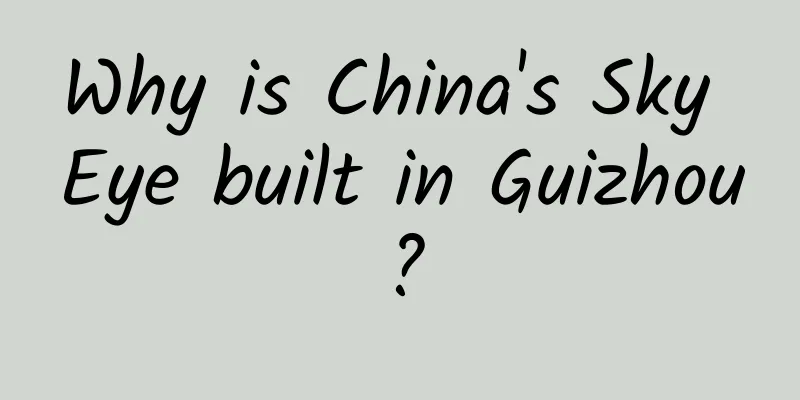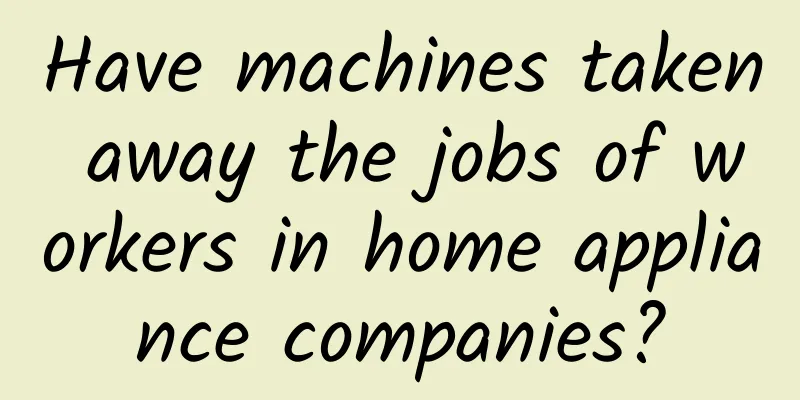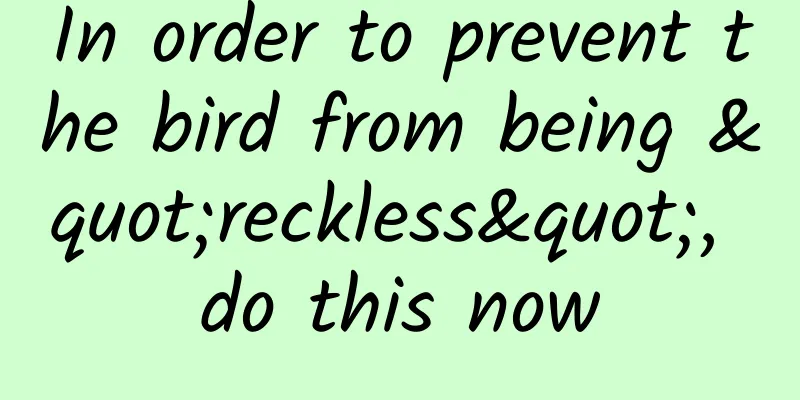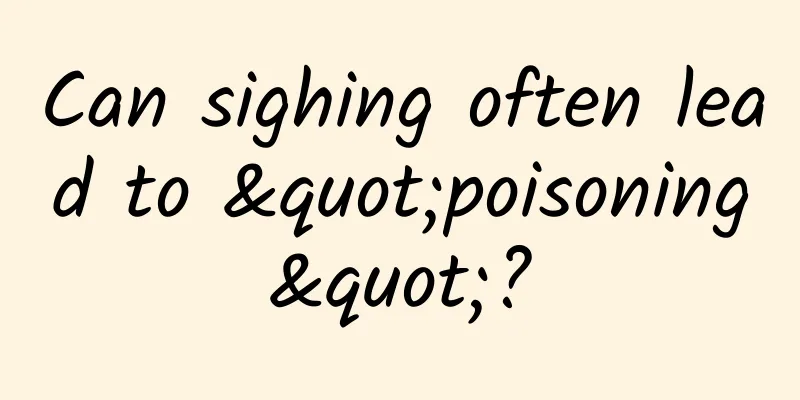Are young people nowadays even starting to "pre-make" their Moments? Go out for fun once, and post it on Moments for five years?
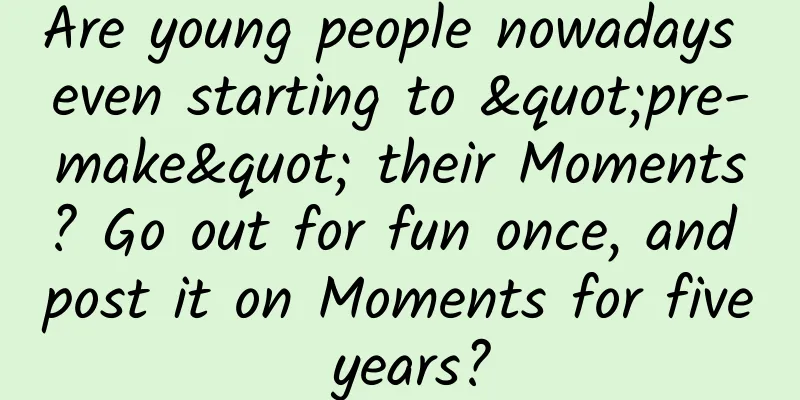
|
Recently, the topic of "pre-made circle of friends" has frequently appeared on the hot search list. The reason is that netizens have been sharing their own "pre-production experiences", which is really hilarious: For example, "My birthday is one week away. The photos have been taken and edited. The copywriting has been completed." Another example is "In Beijing, I went back to the hotel three times a day to change clothes and touch up my makeup, and I posted a week's worth of posts on WeChat Moments after staying there for two days." Some even said, "One month is still too young. I've been preparing for 5 years." This is simply taking the "pre-made circle of friends" to the extreme, and one cannot help but admire the "preparing for a rainy day" spirit of these friends. So what exactly is a "prefabricated circle of friends"? Why is it so popular? This actually reflects a common "circle of friends anxiety". Why is “prefabricated circle of friends” so popular? In fact, "pre-made Moments" refers to the Moments content prepared in advance, including carefully taken and edited photos, accompanied by refined texts, and some users even set a schedule for publishing in advance. This is different from the traditional instant shooting. It is more like a planned "publicity campaign" whose main purpose is to show one's most ideal side. For example, some people will complete the shooting and editing of all photos a week before their birthday and prepare the copy, and then post them one by one on the birthday, creating a natural and casual feeling. Copyright images in the gallery. Reprinting and using them may lead to copyright disputes. With the popularity of social media, more and more people choose to share their daily lives online in order to gain recognition from others and support from society. The emergence of "prefabricated friend circles" seems to have added a new way of playing to this daily routine. On the one hand, it caters to the needs of modern people for time management and personalized expression in their busy lives; on the other hand, it has also become a means for people to pursue their "ideal self" in the digital age. We can't help but reflect: when the circle of friends becomes a carefully decorated exhibition hall, have we lost the opportunity to express ourselves authentically? Behind the phenomenon of "pre-made circle of friends" actually reflects the widespread "circle of friends anxiety". Where does “friend circle anxiety” come from? Behind the “friend circle anxiety” is actually a reflection of people’s unremitting pursuit of the “ideal self” and the “impression management” in the eyes of others. On social media, people build and manage their online presence through the content they post, a process known as impression management. As social media continues to grow, this management becomes increasingly complex. Behind each account is not just a simple expression and sharing, but a carefully planned "personal show". To decorate our own lives and manage our own "personality", in order to accumulate social capital, we spare no effort to invest a lot of time and energy, just like a savvy investor, constantly optimizing our "product" - that is, the online image we carefully create. This is not just a game of self-display, but also an art, an art that requires continuous investment and careful polishing. Every click and every comment may become a plus point for us in this "personality theater". However, behind this performance are countless nights of staying up late to plan, and countless hours of refined pictures and copywriting. Properly managing your own image is like an elegant dance, which can not only show your own style, but also promote mutual understanding and harmony. However, if used improperly, impression management can become a sharp double-edged sword . Excessive packaging and disguise is like wearing a mask to a party. Although it may bring temporary glory, you may eventually lose the most sincere friendship and your true self. Moreover, in this digital age, information is flooding in, not only at a dizzying speed but also in staggering quantities. Everyone is "over-linked". Every day, we are "struggling" in the vast ocean of information, trying to pick out a few useful pieces of information. The result is often that we become more and more dizzy and completely fall into "information overload". At the same time, the popularity of social media has made our social circles unprecedentedly large. The energy required to maintain these online relationships is comparable to tending a virtual garden, and we have unknowingly been caught up in "social overload." When these two "mountains" are on our shoulders at the same time, even though social media brings us endless fun and convenience, the pressure that comes with it can make people breathless. Coupled with our habitual "comparison" psychology, when we look at the personal images of our friends who have been carefully impression-managed in countless information, it is more likely to produce counterfactual thinking, which will gradually reduce our sense of happiness. A previous article mentioned the concept of counterfactual thinking . Simply put, it is to assume a possibility that is completely different from the facts for something that has already happened. This assumption could be better or worse than what actually happens. This concept was first proposed by Nobel Prize winner in Economics Daniel Kahneman and his colleague Amos Tversky in 1982 and is called "The Simulation Heuristic". To put it simply, what really makes us unhappy are often missed opportunities and facts that cannot be changed. For example, you may often hear such sentiments: "If I had bought that stock at that time, I would have made a fortune!" "If I had bought a few more houses in Beijing earlier, I would have achieved financial freedom by now!" "If I had chosen the right major, my salary would have doubled by now!" Behind these "what ifs" are full of regrets about the past and longings for the future. Although these assumptions cannot change the status quo, they often linger in our hearts and become an indelible emotional burden. The beautiful lives in the friend circle under the filter are precisely what give us sufficient basis for this kind of "counterfactual thinking". This comparison not only makes us feel lost, but also often makes us doubt ourselves, as if every day of others is full of sunshine and flowers, while our own life is always full of haze and thorns. Little do we know that everyone's life has its unique side, and those seemingly perfect moments also have unknown stories behind them. How to relieve “friend circle anxiety”? 1 Try downward counterfactual thinking Just like what was mentioned earlier, “If I had bought that stock at that time, I would have made a fortune!”, “If I had bought a few more houses in Beijing earlier, I would have achieved financial freedom by now!”.... In fact, these thoughts are typical upward counterfactual thinking. In other words, it is assumed that if a certain condition had been met at the time, the result might have been much better than it is now. We might as well try to look at things with downward counterfactual thinking. For example, fortunately I guessed correctly on the question I couldn't answer in the college entrance examination, so I was admitted to my current university; fortunately I was forced to memorize words every day, so now at least I don't have to rely on translation software when traveling abroad. Upward counterfactual thinking is often accompanied by feelings of envy and regret, making people wonder "what if...", while downward counterfactual thinking often makes people feel content. After all, sometimes it’s those little bits of luck that allow us to find a little solace in our ordinary days. 2 Develop the ability to be a negative self The "passive self" here is not derogatory, but refers to a state of being able to maintain inner peace without being influenced by external evaluations. Everyone's life has its ups and downs. Instead of envying others' glamorous side, it is better to focus on your own real life and enjoy every ordinary and precious moment. You may envy the vacation photos posted by others, but you may not know how many sleepless nights they endured before leaving to complete the project; you may envy the exquisite home photos posted by others, but you don’t know how much effort they put into decorating and arranging them; you may envy the literary and artistic works posted by others, but you don’t know how many failures and restarts they have experienced behind the scenes. We need to develop the ability to be ourselves when facing external pressure and expectations, and not to care too much about what others think. Only when we truly do this can we truly achieve "not being happy with things, not being sad with ourselves". 3 Record life, not perform it The circle of friends is essentially a space for recording every bit of life. It should be a place for us to reminisce the good times in the past, rather than a stage for performing life. When we realize this, we will find that we don’t need to deliberately create a perfect image. It is enough to just record our daily experiences truthfully. The next time you’re about to go to great lengths to spruce up your social network, take a deep breath and ask yourself: “Is this really necessary? Will this really make me truly happy and fulfilled?” If these efforts bring more annoyance and anxiety than joy, then maybe you should reconsider. In this age of anxiety, our social media has become our performance stage. But instead of envying other people’s lives, it’s better to focus on your own true feelings. Finally, I hope everyone can get rid of anxiety as soon as possible and find their own calmness in the ups and downs of life. The most precious thing is not the likes in the circle of friends, but the peace and satisfaction deep in the heart. References [1] “National Day has not yet arrived, but the circle of friends has already been “pre-made”? ?” Youth Zhejiang, 2024-09-25. [2] “Why is the Internet making us less and less happy?”, Tencent Research Institute, 2022-01-23. [3] “Behind the “Shanghai Celebrity Group”: How does social media affect our sense of happiness?”, Tengyun, 2020-10-14. [4] “Are users fleeing social media? ——A study on the factors affecting social media burnout|Mangzhong Viewpoint”, Tencent News, 2022-06-02. Planning and production Author: Li Ge, popular science author Reviewer: Fan Chunlei, Associate Researcher, Institute of Psychology, Chinese Academy of Sciences Planning丨Yinuo Editor: Yinuo Proofread by Xu Lai and Lin Lin |
<<: So cool! China's lunar suit debuts
>>: If you keep getting acne, it may be caused by this! Dermatologists remind you...
Recommend
One in two people is infected! Bad breath caused by this bacteria is actually a sign of cancer?
Bad breath It can be called the biggest social ki...
Apple's successes and failures in 2015
[Abstract] In 2015, Apple's smartphone profit...
Will picking your nose kill you? Picking your nose feels good for a while, but if you keep picking, you'll cry...
If you ask me why I like to pick my nose Of cours...
Programmers are not bricklayers, they are writers
[[134795]] If you have 10 programmers, the best o...
36 rules for creating hit short videos!
1. Short videos about selling goods 1. Douyin doe...
The elephant is dead, but its tusks are still there. Who killed it?
The old elephant Lugard fell. This male African e...
How to get 100,000+ users through traffic promotion activities?
When we think of growth, what’s the first thing t...
Who is this girl?
I believe you have seen such a girl in many place...
What? A few milliseconds are the same as decades? Unveiling the mystery of fast radio bursts
Produced by: Science Popularization China Author:...
"Chasing the Light" Kola - Visiting the Construction Site of the World's Largest Water-Photovoltaic Complementary Project
——Visiting the construction site of the world'...
Tips for the 2nd phase of the Chan Theory Basic Course in 2022
Tips for the 2nd 2022 resource introduction of th...
How come the famous Nobel Prize was awarded to a football player?
“I was able to achieve some of my success (and wi...
The boundary of the game between brand and marketing!
Don’t ask what your brand can do for you, first a...
Will showing IP location leak personal information? This move is very dangerous
【Written at the end】 The current display function...
The closest I've ever been to the moon is through a telescope.
In spring, everything comes back to life and the ...




